Travel
Why Fez is the must-visit city offering an alternative take on wellness
Beyond the spirited pulse of souks, the echoing calls of vendors, and the spice-laden air thick with cinnamon, you’ll find Palais Amani. A family-run, luxury riad in the heart of Fez’s labyrinth medina, it offers a gateway into Moroccan life, and also a sanctuary from which to craft one’s own definition of a wellbeing retreat.
From the omnipresent Zalagh mountains to the north, to fresh ingredients in the souk and cooking classes at Fez Culinary school on-site, Palais Amani is a place where the exhilaration of discovery and the gentle power of stillness coexist in perfect balance.
Arriving at Palais Amani: An Eden in the maze
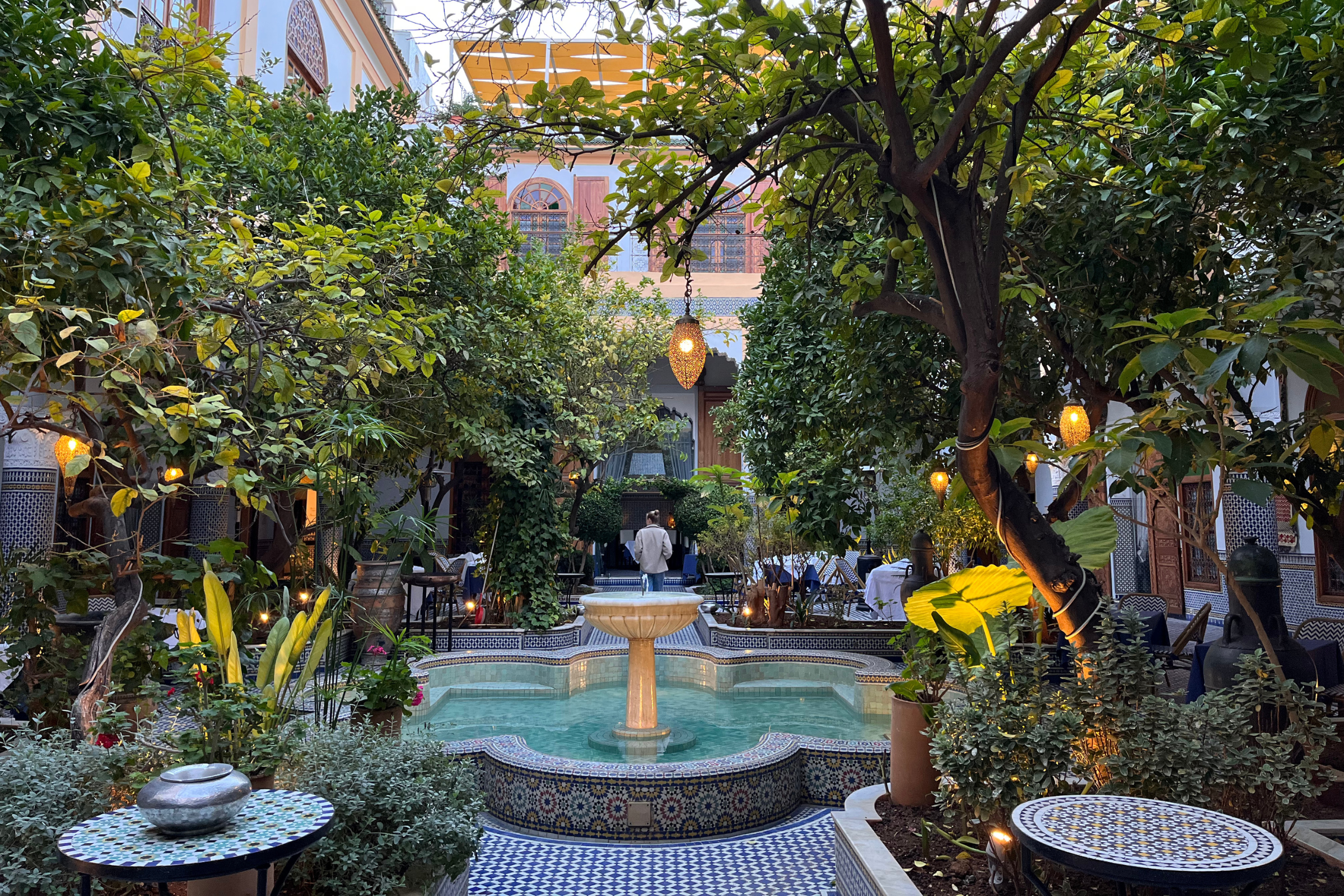
After a 30-minute drive from the airport we arrive at a small plaza on the outskirts of the medina. Our driver beckons us out of the car, and a guide from Palais Amani meets us. We’ve driven as far as we’re able, and from here must continue on foot. We follow a narrow stairway onto a series of tiny streets, and as we venture deeper into the winding veins of the medina, the modern world begins to feel more and more remote.
A walkway here, a right turn there…we trace the steps of a hidden route, one of a million secret pathways in a city that is centuries old. We pass ornate stalls and mosaic walls, and my senses start to awaken. Bursts of colour, distant sounds of artisans at work, and unfamiliar smells all muddle together until out of nowhere an unassuming door opens. We have arrived.
We are ushered into the riad and enter a serene quad known as Eden. It’s silent, but for a few bird chirps, and filled with citrus trees. A true oasis from the overwhelm of the maze we’ve just left.
Friendly hosts welcome us and serve us fresh mint tea with local pastries, our first taste of Moroccan hospitality. Then we are taken to our luxury suite — a spacious, traditionally decorated complex with a deep bathtub, sofa, and modern amenities. We ascend to our private rooftop terrace and spend the afternoon basking in the sun, taking in the fresh air and enjoying views of the medina and mountains.
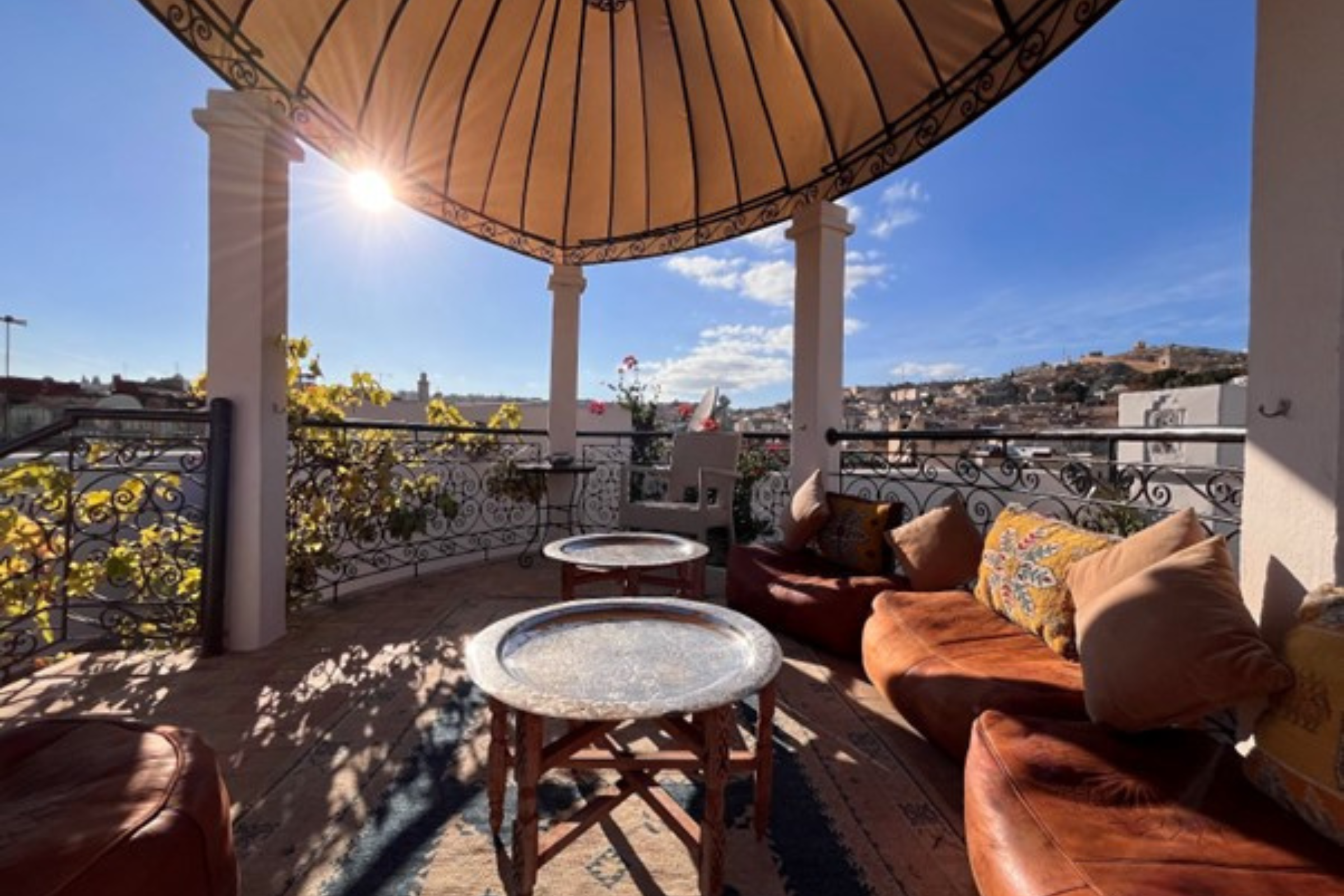
Learning to lengthen breakfast
Breakfast at Palais Amani is truly special. Served al fresco in the Eden quad or in the indoor dining area, it’s a carefully curated selection of dishes that blend healthy fibre, vitamins, and protein.
Uniquely, there are multiple courses. First up is the ‘Healthy Conscience’, with homemade yoghurt, fresh and dried fruits, honey and juice, followed by the ‘Discovery of the Day’, which introduces us to a different Moroccan dish every morning. These include harira, a thick tomato soup with chickpeas, lentils and vermicelli; fava bean soup with cumin, vegetables, and olive oil; and various fibre-rich, whole-wheat breads.
The abundant breakfast is a banquet for the senses. All the courses are served together, and accompanied by local soft cheeses, jams, and eggs. As the offering is so plentiful and the window for service is long, we feel encouraged to journey through every item, and experiment with new combinations.
It’s a mindful experience, taking time to savour every texture and taste. As the days pass, ‘slow breakfast’ becomes a game-changing ritual — a deliberate interruption to the habit of rushing. Starting each day with intentional slowness signals safety to the body, activating the parasympathetic nervous system and bringing calm to our minds.
Purification rituals at the Hammam
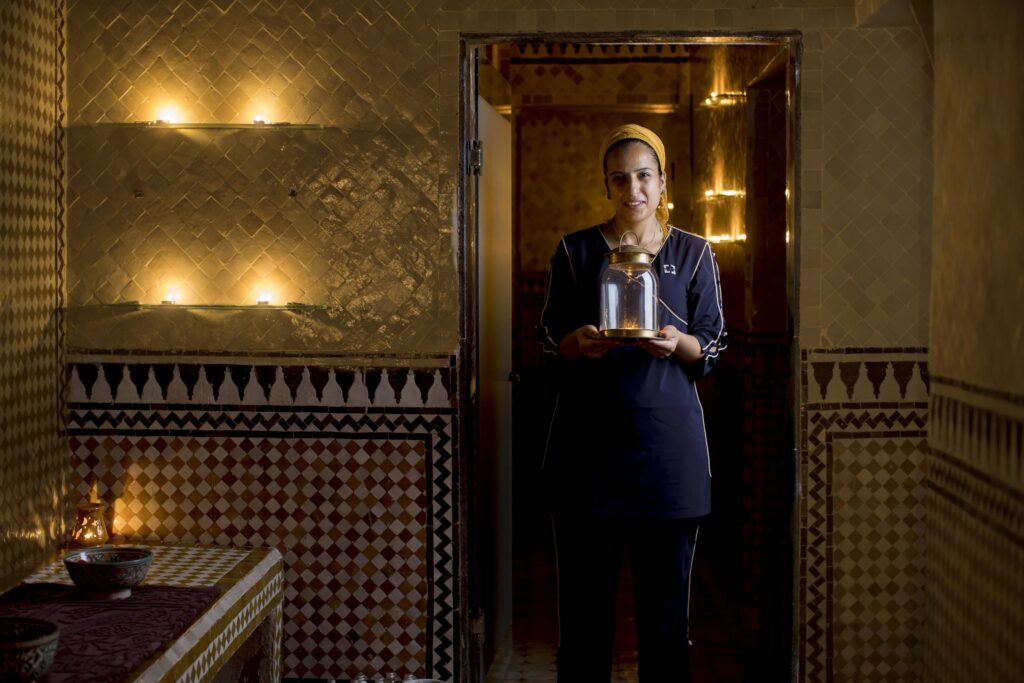
No visit to Morocco would be complete without a trip to the hammam. An ancient practice revered for its cleansing properties, it’s a cornerstone of Moroccan culture and a vital access point to community for local people. We opt for the Traditional Hammam, an immersive sensory experience that channels candlelight, natural products, and soothing aromas.
“The hammam spa experience is not just a modern phenomenon, it’s a time-honoured tradition that is packed with health benefits.” Keltoum, Spa Manager
We begin with hand and foot baths, followed by a wheat scrub to cleanse the skin of impurities. Next comes a hair glaze using ghassoul, a natural clay extracted from the Atlas Mountains, before we move into a steam room complete with heated walls and floor. From there the detoxification continues with a warm rinse and the application of black soap — a local product made with olive oil and eucalyptus leaves.
Next we enjoy a refreshing glass of citrus juice with ginger, before experiencing a thorough scrub with the abrasive hammam gloves. Finally, we wash off in a shower, indulging in a rose water shampoo and an orange blossom shower gel. We leave feeling silky soft and, as you might guess, incredibly clean.
Slow dining and stargazing
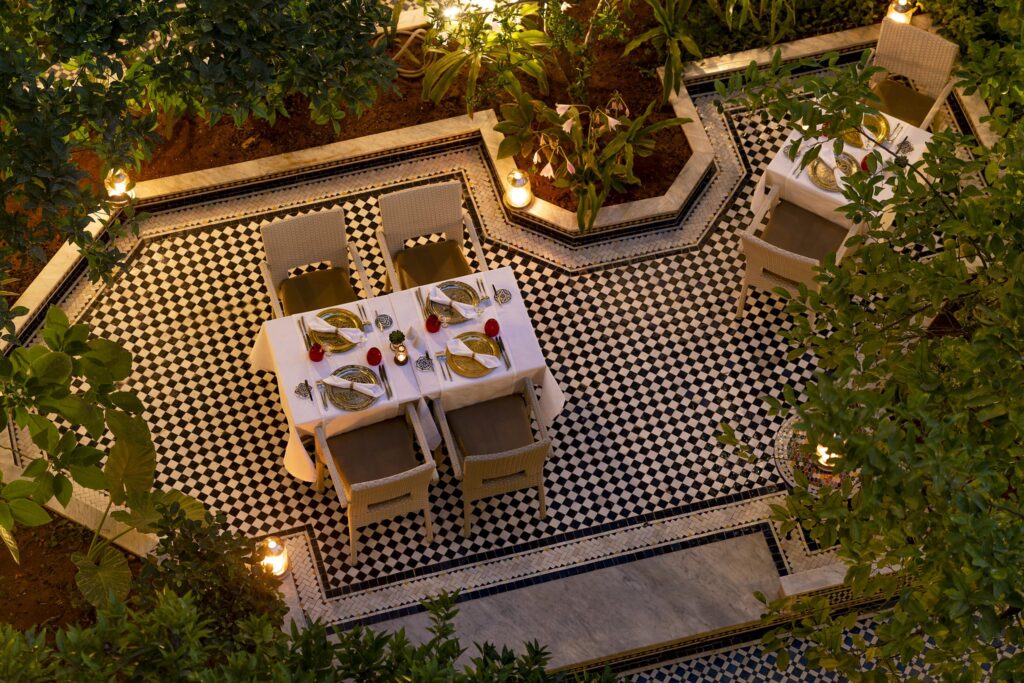
Inspired by the idea of slowing down, we sign up for a three-course dinner, seated outside in the Eden space. Beneath the sky and the leaves of the citrus trees, we delve deeper into Moroccan cuisine, which is a blend of Arab, Berber, Andalusian, and Mediterranean influences. Dishes are often garnished with dates, sharp olives, nuts, and spices, adding unexpected clashes of sweet and sour, earthiness and heat.
“Moroccan cuisine is renowned for its rich, mouth-watering flavours and diverse, exciting ingredients, each contributing to the intricate tapestry that defines this culinary tradition.” Yassine, Food and Beverage Manager
Over the next few hours we journey through a whirlwind of flavours, from gently spiced, crunchy Moroccan briouats and crushed olives to a deeply rich lamb tagine stewed with seasonal vegetables and topped with pickled lemons. Cumin, coriander, saffron, and cinnamon play a leading role in creating the distinctive taste profiles of Moroccan dishes, and celebrate the abundant produce of herbs and spices grown locally.
As with breakfast, we feel guided by the reverence placed on food within Moroccan culture — the unspoken invitation to take our time, to savour meals in good company and to lean into community. We end the night with a trip to the rooftop terrace to gaze at the medina, stars and full moon. Poised between the chaotic streets below and the towering silhouettes of the mountains behind, this private space (and the riad in general) offers a place to be still.
From produce to plate: Fez Culinary School at Palais Amani
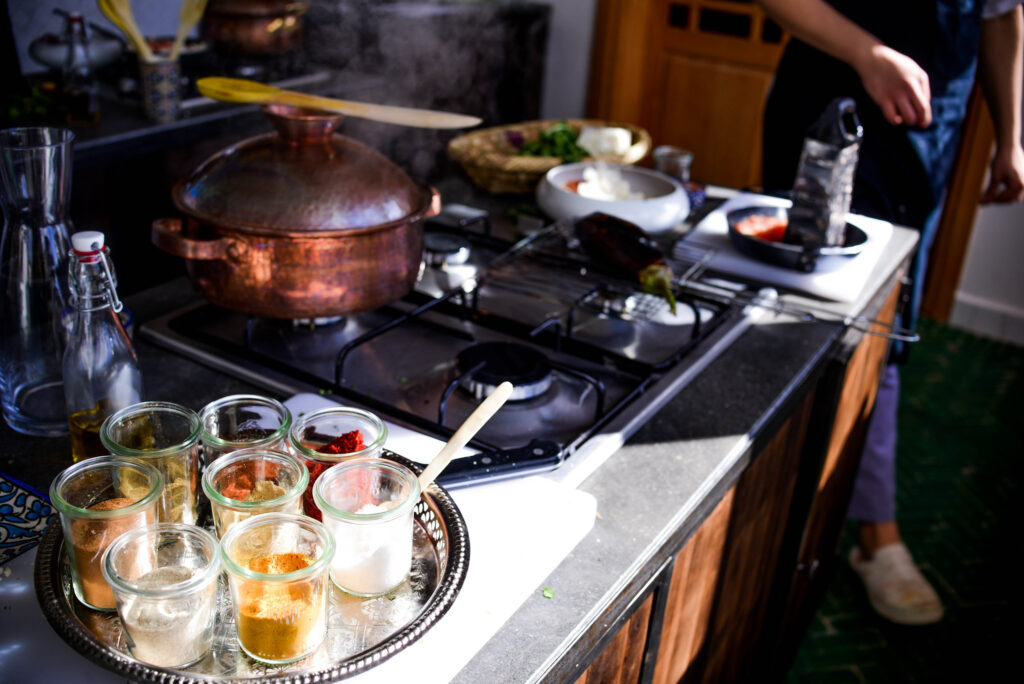
Though we had visited the souk a few times during our stay, it wasn’t until our guided tour with Palais Amani’s Chef and Experience Manager that we really began to connect with it. This is no coincidence. The option to gather ingredients from the market ahead of the class is a vital part of the experience. We learn about the journey of produce to plate, and the role the medina plays in anchoring relationships, community, and livelihoods.
“Guests get a chance to discover Moroccan life and traditions by visiting the neighbouring food market before heading to our rooftop cooking school. It’s both a culinary and a cultural journey.” Loubna, Experiences Manager
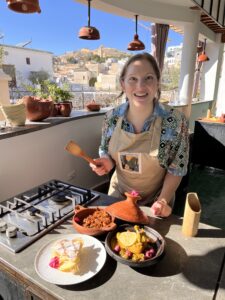 When we return to the riad, we cook a series of traditional dishes on the rooftop, enjoying mountain views, golden sunlight and a cool breeze. Again, there’s an emphasis on enjoyment and appreciation, shining a spotlight on the impact one’s relationship to food has on health and wellbeing more widely. It’s the perfect end to our trip and a great way to build friendships with other guests.
When we return to the riad, we cook a series of traditional dishes on the rooftop, enjoying mountain views, golden sunlight and a cool breeze. Again, there’s an emphasis on enjoyment and appreciation, shining a spotlight on the impact one’s relationship to food has on health and wellbeing more widely. It’s the perfect end to our trip and a great way to build friendships with other guests.
The verdict
Palais Amani is an excellent base for crafting an alternative wellbeing break. The superb culinary offering, which ranges from on-site dining to cooking experiences, combined with the hammam, luxury suites and optional activities like yoga and picnicking in the Zalagh hillside provide guests with a rich framework from which to design an itinerary and pace that feels right for them.
Morocco is also one of the countries named by UNESCO as representative of the Mediterranean Diet, which was recognised in 2010 as an intangible cultural heritage of humanity. The culinary experiences at Palais Amani certainly stand out as highlights of the visit, offering the perfect blend of new discovery, nutrition, and indulgence, and introducing guests to new perspectives to take back home with them.
Having said this, Fez is also a destination where proactivity is rewarded. As two female travellers, we found the medina quite overwhelming on our first two visits, and had a far more enjoyable experience during the tour ahead of the cooking class.
A guided tour is a great option, and essential if there are areas you’d like to avoid. For instance, the meat section and local tannery will be upsetting for some, and should be avoided by travellers opposed to animal products including leather. Some visitors — particularly solo female travellers — may feel uncomfortable heading out alone at night, and they should factor this in when making dinner plans.
Rooms from £180 per night. Find out more.
Read more in Travel
- “I went to an Ayurvedic retreat – here’s what happened”
- The Yorkshire spa hotel reconnecting guests with nature: “It felt like hibernation”
Words: Hayley Hamilton





